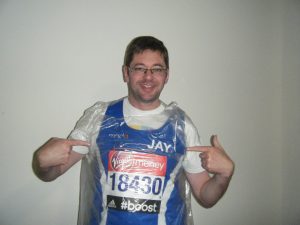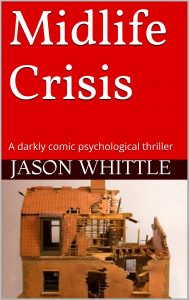I know that you studied the level 2 and level 3 writing modules at the Open University. What other modules did you study? When did you graduate?
I worked my way through the levels very gently at first. It began with Start Writing Fiction, which seemed the ideal way in. Brilliant little course that, available for free through Futurelearn now, and I’d recommend it to anyone.
At that stage I wasn’t sure I’d take it any further, but I did alright, so tackled another two 10 point short courses, Making Sense of the Arts and Introduction to Shakespeare, and by then I did have the confidence to go for actual qualifications. The Arts Past and Present and the ‘wild card’ Croeso: Beginners’ Welsh brought me my Certificate of Higher Education, Creative Writing and being part of the very first Reading and Studying Literature intake got me my Diploma (and some very valued friendships), and Advanced Creative Writing and 20th Century Literature completed the English Lit BA in summer 2014.
Why did you choose to study at the OU and why did you choose the modules you actually studied?
Not to put too fine a point on it, it was the only educational avenue available to me. Having been something of a child prodigy, tipped for Oxford or Cambridge from a young age, I succumbed to a teenage depression and dropped out of college without getting anywhere near sitting my A-Levels. For seventeen years I thought that was it for me and education, until it occurred to me that the OU could be a route back in. That’s what I love most about it; it’s a second chance for those whose potential would go unrealised otherwise.
As for the modules, it had to be based around literature and creative writing; that was all I wanted to do. Apart from taking Welsh for my free choice, because a small but significant part of my family history comes from there – my great grandfather survived the 1913 Senghenydd coalmine disaster.
Which aspects of the Open University Modules were useful for the development of your writing, and why/how were they useful? Has your writing changed after doing the OU modules?
Everything was useful in its way, and I do feel that English Lit study can only be beneficial for writers. Ironically, I scored really low on the Creative Writing modules, by the far the lowest of any of my modules (but not bitter, honest!), but that doesn’t mean I didn’t take anything from it. Sorry for the plug, but I think my short e-book Aberfan and Senghenydd, based on the two Welsh coalmining disasters, demonstrates my evolution perfectly. ‘Senghenydd’ was written in early 2010, just before I started at the OU. I’m proud of the story, it’s full of pace and derring-do, with a lot of heart and passion, but it’s also written without any guile or real understanding of the craft. ‘Aberfan’ was written last year and is a much more nuanced affair, poignant and cerebral, with a greater reliance on the subtext.
Tell us something about your further plans of writing-related studies.
I’m currently battling through the final stages of a Creative and Critical Writing MA from the University of Winchester, and am already pitching a PhD project. No solid news on that yet, but I hope to get started in 2017. Project title is “Exploring the Relationship between Dystopia and Reality in Fiction and Reportage” and it will consist of research into dystopian fiction past and present, how it reflects on the time it was written, and which dystopian visions are already coming true, alongside writing my own novel Overcrowding in which austerity has taken such a firm hold that human life is secondary to penny-pinching.
About your writing: Do you write in a specific genre or do you have a specific focus in your writing? If so, why? Do you write short stories, novels, poetry, something else or all of the above?
I am a real genre-hopper, and vary my project lengths, but have a preference for the novella. Debut novel and some of my published short stories are in horror, and I write a lot in the inter-related sci-fi and fantasy genres (but usually with a real word basis). I have two crime series that I’m working on, one which I’m trying to work out whether it’s suitable for children, and the adult-oriented one which swings back and forth between cosy and hard-boiled. I write poetry, script, and non-fiction, and also dabble in the two very different disciplines of sports reporting (with a recurring page in the Chester FC match programme) and erotic fiction (under a pseudonym, needless to say).
If there are any recurring themes in my fiction, they would be dark humour, and the Everyman who makes regrettable life decisions.
You have recently been contracted by Kristell Ink – Can you tell us a little about the work you’ve been contracted for? What genre is it? Is it a standalone novel, or part of a series? Anything else you can tell without offering spoilers: perhaps the blurb, and/or some info on the setting, characters, story. And when can we buy it?
It’s a standalone novella called Escaping Firgo, due for release next year. I called myself a genre-hopper, but I’m more of a genre ignoramus, because I struggle to put a tag on this. It must be sci-fi or fantasy, I suppose, maybe a bit of both. I prefer to say speculative fiction. The publishers have teasered it as ‘Hot Fuzz meets messed-up Trumpton’, while I would admit to there being a Patrick McGoohan Prisoner influence, in that the main character is trapped in a weird village and trying to find a way out.
But it’s also based on a real incident: there’s an actual place called Firgo, a small hamlet in north Hampshire comprising a single house and some farm buildings. My friends and I had the misfortune to have the car break down there – twice! – and we ended up wandering around the local village on a frosty Sunday morning asking an increasingly eccentric set of locals for help in getting home. I went back there earlier this year, as described on my blog.
Is you novel Midlife Crisis based on personal experiences? If so, how far? Is Clayton, the main character, a lot like you? If so, in what ways? And in what ways is he not like you?
Like Clayton, I am a jogger, and like Clayton, and many others I’m sure, I sometimes wonder where my youth went. I started writing this at the age of 37 – it was my Level 2 Creative Writing EMA. I was partly inspired by one of the module’s quoted texts, What I Know by Andrew Cowan, which also begins with the main character’s 40th birthday, and the novels of James Hawes, which often feature an Everyman whose life unravels. Clayton is an Everyman with a twist: does his experience really transform him? Or merely unlock who he was inside all along?
The atmosphere of the novella changes very drastically throughout the story. Was that planned? When you started writing it, did you already know roughly how it was going to end, or did the story develop while you were writing?
Yeah, I often have the entire story, at least the main narrative arc, in my head before I even start typing, and that was the case here. The assignment instruction was to write a 100 word summary of the rest of the plot, and I stuck to that completely. This is me at my most Hitchcockian: Psycho starts off as a heist crime adventure before changing tack, and The Birds is ticking away nicely as a fluffy rom-com (with just a hint of foreboding), before the pecking begins, and I’ve always wanted to write something that goes one way at first before shocking everyone with a sudden turning point.
The novella contains grisly and visceral scenes – can you explain how you developed these scenes? Now that the book is published, what are your thoughts and feelings about those scenes, and about the fact that people read them?
I come from a horror background, so edgy content is the norm for me (Escaping Firgo is the exception, with no swearing and minimal violence). So the dark interior of my mind has already been exposed – difference there being that shocking scenes are expected in horror, whereas after being lulled by the opening, this will have maximum impact.
I thought about issuing a trigger warning, but didn’t want to put a spoiler on what I hope is a memorable experience for the reader. Biggest worry is for the daughter of the man who created the house on the cover. As per this blog post, the cover, therefore the book, goes out in his memory, but if his friends or family buy it as a tribute, they might expect something less, well, grisly and visceral.
Finally, do you have any tips for wannabe published writers? (Yes, you are now at the level of wise and knowledgeable adviser! 😉 )
Just write, as much as you can. Don’t worry about how good it is – the worst thing you’ve written is still better than the best thing you haven’t, and you can make it better later. Also read as much as you can, a variety of authors, a variety of genres, even a variety of quality, and ask yourself, what’s good, what’s bad, and how can I make this better? You can learn as much from a self-published potboiler as a literary classic, and assimilate everything, and make it part of your own writing style. And then you’ve got a chance, at least, of reaching your audience.


